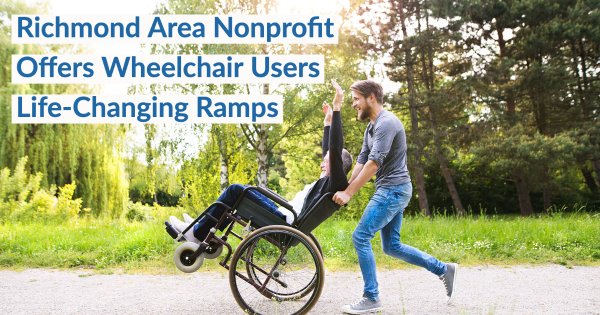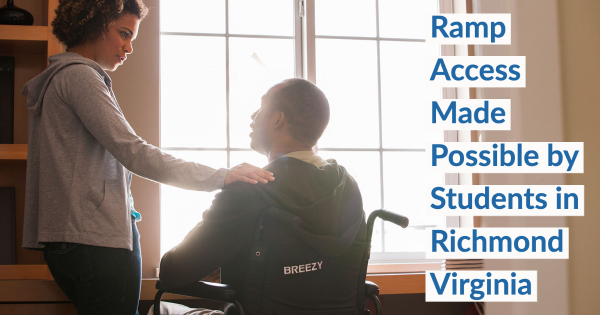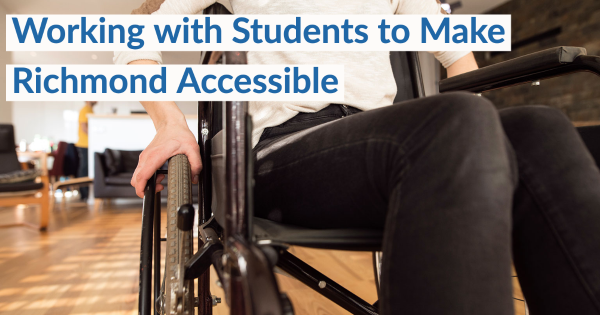
More Americans are in need of wheelchair accessibility than some might think. The reality is that an estimated 3.3 million people in the United States are wheelchair users, but many of the places that they visit in life are not accessible. The term “accessibility” refers to the ease with which a wheelchair user can move from one place to another, whether they are attempting to enter a building that is elevated off of the ground, or trying to move into a car. Much of American society is built for people that do not use wheelchairs. Stairs, for example, are incredibly difficult for wheelchair users to cope with. But many locations with stairs do not offer alternative options like ramps, despite the fact that it does not cost much time or money to build simple wheelchair ramps. This is especially challenging within high-density areas, where there are more people present and therefore more people in need of wheelchair accessible options. Richmond, Virginia is one location in which wheelchair accessibility has historically been a real challenge. This is why RampsRVA is attempting to enact real change within the city, and in turn make life easier for Richmond’s wheelchair users.

RampsRVA, which is short for Ramp Access Made Possible by Students in Richmond, Virginia is a nonprofit organization led by Susan Revere. Fully aware of the value of mobility aids like wheelchairs and how crucial it is that Richmond is accessible for users, Revere has utilized both her organizational and planning skills to spearhead the construction of wheelchair ramps. In total, she has helped build simple wheelchair ramps numbering at 440, free of charge, for Richmond residents and those in surrounding areas that need them. The challenges in cases like these also stem from an inability to have the ramps built affordably and efficiently. RampsRVA and Revere are able to make this process more streamlined and cost efficient by working with college students in the area. Not only does this accomplish the specific wheelchair-related goals; it also offers the students empowerment and opportunities that they would otherwise be denied.
Working with Students to Make Richmond Accessible

Richmond and the surrounding areas are home to multiple colleges and universities, perhaps most notably the University of Richmond and Virginia Commonwealth University. Furthermore, public and private high school students abound in the region. Therefore, there are plenty of able bodied high school and college students that can offer their skills and help build simple wheelchair ramps for those in need. These students act as volunteers, which not only cuts down on the costs associated with making the alterations that accommodate medical equipment like wheelchairs, but aids the students in turn. Many high school and college programs require students to accumulate volunteer hours, and with good reason. When students donate their time and energy to organizations like RampsRVA, they are able to learn about people that live different lives from their own. The people that benefit from RampsRVA are not only wheelchair users, but often economically disadvantaged. They are not able to pay for the renovations necessary to make their own homes wheelchair accessible in many cases. In terms of Richmond, this allows many students to not only meet people that they otherwise would be unfamiliar with; but to see parts of the city that might be previously unknown to them.
By working with RampsRVA and Revere in particular to build simple wheelchair ramps, students are able to understand why she does what she does and learn from her empathy and kindness. Recipients of her work are able to feel as if they are really being cared for because, in fact, they are. Revere is passionate about her work and derives personal satisfaction from helping those in need, whether they live in a senior living community or the suburbs of Richmond. She feels humbled and empowered by her work, and ideally, students that are still growing up will feel similarly after they offer assistance. It can be difficult for students, and in particular underage students, to feel empowered and like they are doing something truly positive for their communities. RampsRVA allows them to take very real responsibility for helping people firsthand.
Additionally, students are able to see and understand the difference that this makes for recipients of rants. Wheelchair users that are unable to leave their homes or even get around their homes as they should, or enter their cars as they need, are at incredible disadvantages. Many public buildings, as well as homes built on residential property, are constructed without wheelchair ramps. Though every wheelchair user is at a disadvantage when they are unable to use accessible features like ramps, they are especially disadvantaged if they became wheelchair users later in life. Those that adjust from being able bodied to using a wheelchair need to learn how to use ramps, and if ramps are not available within their homes, this is incredibly difficult. The lack of ramps will not only make it difficult to move around their own properties but the world at large.
Not only does this cause practical difficulties, such as problems in obtaining work and even grocery shopping; it can also lead to depression. Wheelchair users want to be as independent as possible, and many would be capable of being quite physically independent with the aid of a ramp. Although it does not take much effort to build simple wheelchair ramps, the emotional effect that these ramps have for wheelchair users can be massive. With the help of RampsRVA, wheelchair users do not need to pay money that they don’t necessarily have on hand in order to get the help that they need. Genetic issues, injuries, and chronic diseases among other conditions can all lead people to require the use of wheelchairs. But there is no reason why those in need of wheelchairs should be unable to move where they wish.
The History Behind RampsRVA

While it’s remarkable that students are currently helping RampsRVA to build simple wheelchair ramps for those that require them, the story behind the organization is also impressive. The organization was founded by a group of students at Richmond’s Collegiate School in 2005; however, its success was actually too great for the students to handle initially. The demand for wheelchair ramps and other accessibility aids exceeded the resources provided by RampsRVA. This is why Susan Revere was brought in to help by the nonprofit’s board of directors. Revere was able to organize RampsRVA and make it more professional, adding oversight that would make it easier for the organization to accomplish its goals.
Part of Revere’s efforts included expanding RampsRVA in order to encompass more schools. The more schools that were able to access the organization, the easier it would be for there to be enough volunteers available to build simple wheelchair ramps at a rate that can accommodate everyone that needs them efficiently. Furthermore, this enables more students to benefit from the empowerment and other benefits offered by the organization. Additionally, companies were allowed to work with RampsRVA. Many companies appreciated the fact that they could donate volunteer days to RampsRVA, and this was previously impossible until Revere became a part of the nonprofit.
Additionally, Revere has been able to raise money that can help RampsRVA continue on with its mission and potentially do more good for the community. It’s important that potential donors understand that the ramps installed by RampsRVA are made of hardened steel and usually cost around $3,000 per ramp. Although it is important for RampsRVA volunteers to be able to build simple wheelchair ramps, wheelchair users in the area need additional help. Many require home renovations that will allow them to better use their doors, attics, basements, and even their general appliances. It can be difficult to accomplish this without proper funding, which is why Revere has raised over $1 million for RampsRVA over the course of her 13 years as executive director, with the help of her volunteers. Revere has been directly involved in the installation of hundreds of ramps.
In total, she also been able to recruit roughly 1,000 different volunteers across 27 Richmond area schools. These include both public and private high schools, colleges, and universities. A single year may involve coordinating 150 volunteers for Revere, deploying them to various locations throughout the region. Revere is so hands on with the efforts of RampsRVA that she drives a truck that not only contains photos of volunteers and ramp recipients, but equipment needed to do the work that RampsRVA supplies. The back bed of the ramp includes screwed fittings, bolts, nuts, washers, and spray paint that will make the ramps appear more uniform. Additionally, the truck is emblazoned with the RampsRVA motto, advertising its cause to the area at large.
The Value Behind The Work

It’s true that the work RampsRVA provides requires a good amount of physical work. While machines can be used in part to build simple wheelchair ramps, volunteers also need to be ready to do the work, as Revere does. Prior to working for RampsRVA, Revere was a stay at home mom and worked sometimes as a substitute teacher for Gordon Elementary Schools in Chesterfield County. She has previously worked as an office volunteer for project:HOMES, which eventually led to her interviewing for and receiving the position at RampsRVA. Wishing to work with both students and older adults, she began working at RampsRVA almost immediately.
The flexibility of the position means that Revere is able to benefit directly from the role as well. She is able to work from home while at the same time offering RampsRVA her full dedication; she is even able to coach soccer as she wishes to. While working, she also is obviously dedicated building ramps, loading her truck, and writing grants as needed. Driven not only by her need to help people by building ramps but a desire to help students by giving them the opportunity to volunteer, she wishes to create a sense of community in students. Furthermore, the students are able to invest emotionally in the projects in that they are able to select the person that they assist. A student could help an individual that suffers from the same condition as a relative of theirs, and therefore requires the same home health care aids. Students are really able to connect with people and are able to see the results of their work directly.
In this sense, RampsRVA offers an opportunity that differs in a major sense from the volunteer work offered by different organizations. Students often volunteer in more indirect ways, and although this type of volunteer work is worthwhile, it can be difficult for them to recognize the full extent of their direct impact on the world around them if they lack a proper connection. The work that RampsRVA does not only helps students earn the volunteer hours that they may need or execute a single good deed; it will ideally inspire them to volunteer in the future as well. Not only will they volunteer for RampsRVA, but ideally they will volunteer to help other worthy causes in the future. Perhaps in the future, students that volunteered for RampsRVA will also be able to launch their own nonprofit organizations. As previously mentioned, wheelchair users need more than just ramps, however valuable those additions may be. They also require things like altered entry doors and vehicles that can accommodate their needs. Ideally, students will be moving forward with their volunteering and help accommodate these problems as well.
The benefits of RampsRVA move beyond organizing volunteers to build simple wheelchair ramps. This organization can give students purpose, and perhaps even inspire them in their future lives. The work that Revere and her volunteers are doing will ideally help direct recipients and those involved in the organization alike. The more that RampsRVA expands, the more that it will be able to help. Under Revere’s leadership, there is little doubt that it will be able to accomplish its goals in the future.